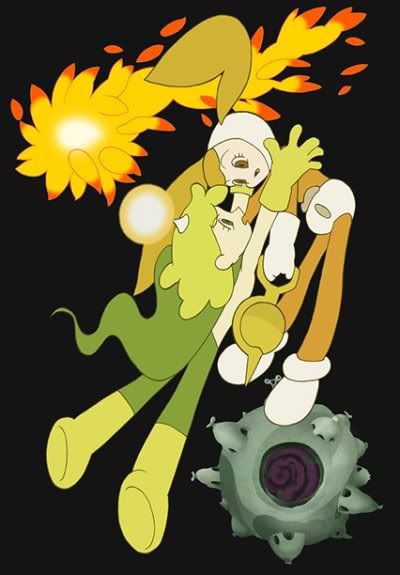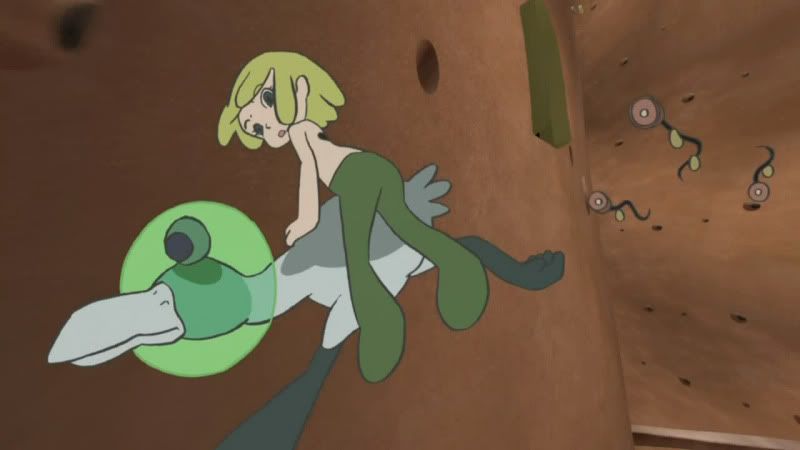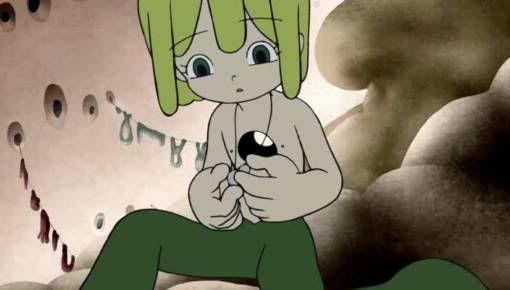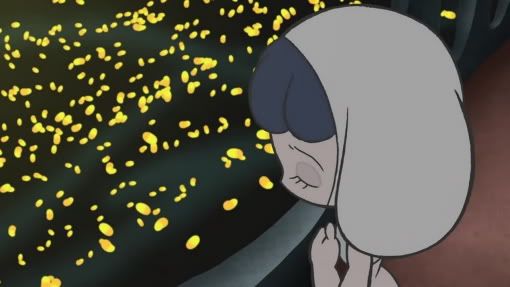
*NO SPOILERS IN THIS SECTION*
I sat down at 4:30 on Sunday with the intention of watching the first episode of Kaiba. At 9:00, I had finished the series. What I found wasthe single most original, quirky, sweeping, science-fiction adventure-romance-epic I have ever witnessed. Looking back, it is easy to see how a title like this flew under my radar without being noticed for nearly a year. It's partially depressing, but at the same time, it gave me an extra year's worth of knowledge, experience, and exposure to other stories that truly allowed Kaiba to stand out.
Kaiba's world is what you would expect if Dr. Seuss was the major creative force behind a piece of animation. The various planets, creatures, vehicles, and weapons drip with originality. From a cyclops ostrich wearing an astronaut helmet to bug-eyed, puckered-lips flies, to something called a skonk (your imagination can run wild with this one), the richness and variety in character and concept design provides a universe of never-ending surprises for the traveling characters.

Time to drop some plot information before I go any further: Kaiba is the name of the amnesiac protagonist. He wakes up in what appears to be either a prison cell or a very sparsely furnished apartment, cradled the rubble of a window. He has a gaping hold in the center of his chest, a triangular stamp on his stomach, and a pendant around his neck, containing a blurry picture of a girl. What follows is the most wild, frenetic chase sequence in all of anime, as Kaiba is instantly forced to take off and run from a group of flying creatures that suck out people's brains. He is quickly aided by the cyclops ostrich mentioned above and winds up being catapulted into a waterfall with a village on the other side. It is confusing, mainly because the viewer, like Kaiba, has no conception of what the world should be or what those creatures are or what the hell is going on in the first place. It is a meaningless, blurry, rocky ride that quickly establishes the uniqueness that pervades the entire series.

Upon entering the waterfall village, Kaiba is (re)introduced to the other brilliant concept that drives the series. In this universe, people can pay to have their memories turned into physical data. (Yes, it is, in some ways, a lot like Joss Whedon's Dollhouse, but Kaiba beat Whedon to the punch by nearly a year). This ability lays the groundwork for establishing the big moral crises examined over the course of 12 episodes. What is a soul? What is a person? How can you define gender when bodies are expendable? What are the ethics involving memory manipulation? Is immortality such a great idea?
Probing the answers to these questions is always a difficult task. Kaiba succeeds by letting each bit of philosophy unfold as the characters travel from world to world.

*HUGE SPOILERS FROM THIS POINT ONWARD*
While stowing away on a ship, Kaiba meets a fellow passenger hitching a ride by pretending to be cargo. When she is finally caught and fails to produce a ticket, the guard shoots her down, turning her into a splashing ball of goo. The guard is shocked to find that the girl's memory chip does not fall from her head--it turns out she never had enough money to pay to have the memory storage done. Instead, her life is cruelly erased. The weapon used illustrates the blatant loss of value of a body once memory can be stored. He fires without thinking, intent on being able to pick up her memory chip and file charges against her at a later time. What he does is completely eliminate a human life.
The issue stems further when it turns out that people can pay to have bad memories erased and good ones artificially added. Discarded memories take the form of little yellow pills, called roe (yes, the same as the word for fish eggs). While sailing through the universe, Kaiba occasionally catches a glimpse of a giant sea of memories, floating endlessly. It is a truly depressing sight, when you realize that each and every little pill is a memory that has been lost or discarded. At best, human life is a series of memories and human history is the passing down of memories from person to person. Without concrete memories, Kaiba's world has no past: its residents are forever stuck in the present by their own choosing.

One planet serves as a consumer utopia. New bodies are designed every day and people pay money all the time to make sure their body is the latest and most stylish. The planet is so incredibly rich that no one ever has to pay for food. This consumer culture, again, shows the uselessness of a human body. The richest man on the planet chooses to have the body of a baby, while others go with 4-armed bodies and horns. Despite being completely artificial, everyone seeks to own one of these bodies, ready to discard their current one with every changing hour. But what does a society do with all of the discarded bodies? That is a plot point I'll leave unspoiled.
Another heartbreaking story unfolds on a tiny planet where Kaiba, now using a stuffed animal body after his original body is captured, meets a girl named Chroniko, who sells something called shabo on the streets. Chroniko's interactions with Kaiba reveal the class disparities that exist in the universe. Since she is adopted, Chroniko has decided to sell her body (literally) because the elites desire young bodies that are not factory produced. She hopes that the money her family will get from her body will allow them to let their children grow up and become rich so they can buy her another body. When the day of her memory transfer arrives, Chroniko's handler simply empties her brain instead of storing her memories on a chip. Judging from her step-mother's reaction, this was planned from the very start. It is, once again, a tragic end for an innocent character who was caught up in a society that is only a utopia for the wealthy.
Kaiba winds up stealing Chroniko's body back and using it as a vessel for himself for several episodes. In order to keep moving onward in his journey to recover his memories, Kaiba catches the attention of a ship's guard and uses his new body's sex appeal to get a free ride. While not the most original plot device, it re-activates Kaiba's memory regarding romance and the picture of the girl in the locket around his neck. He then meets a woman whose memories have been implanted in a man's body. By talking to this man, Kaiba learns that if he stays in the body for too long, he may forget that he was ever a man in the first place, insinuating that gender is something humans adapt to--they are not born with it. Even stranger, the man seems to recognize Kaiba in this girl's body, and vice-versa.
Along the way, Kaiba comes into possession of a gun that opens up people's memories. The user can then, literally, step into that person's thoughts. Many times, a person's memory storage is depicted as a series of library shelves, but it varies from person to person. Some brains house portrait collections, others have painting supplies. It is a brilliant, terrifying concept. When memories can be accessed at will by others, it raises huge moral issues. Who has the right to access another person's inner-most thoughts and emotions?
Kaiba delivers so much more, in terms of story. The narrative covers religious cults, political deception, sibling rivalry, consumer greed, the destruction of nature, and the continuous devaluing of human life with every passing moment. The love story, which has echoes of Eternal Sunshine of the Spotless Mind, does not fail to please. In fact, by the time all the pieces of the Kaiba's broken memory are reassembled, it is both satisfying and heartbreaking.
If you want an anime that is truly refreshing to experience, please pick up Kaiba. It truly is the best of the best.

No comments:
Post a Comment